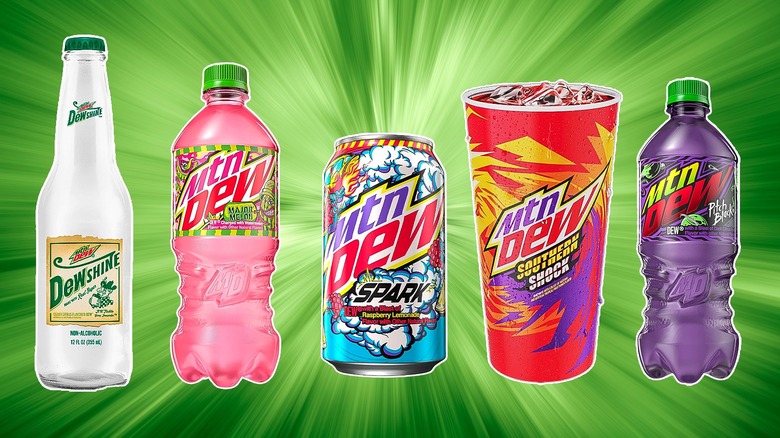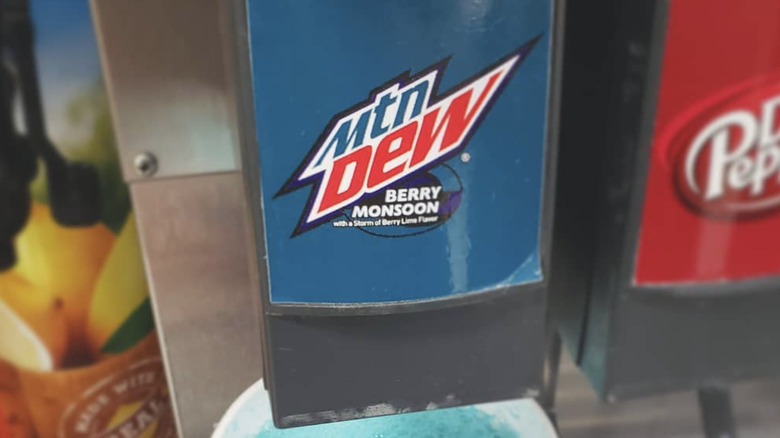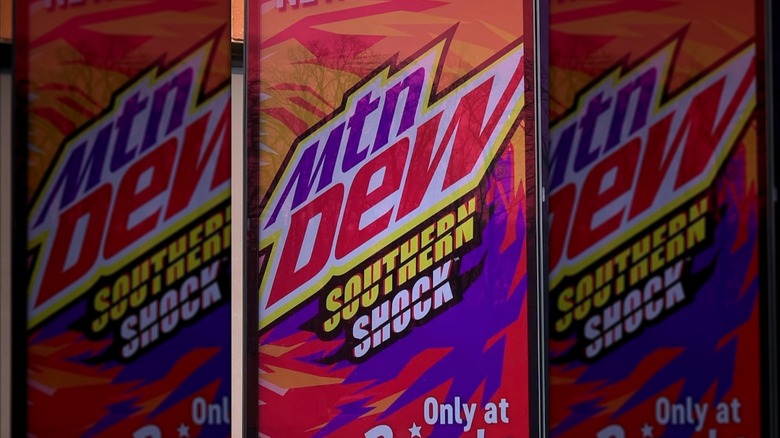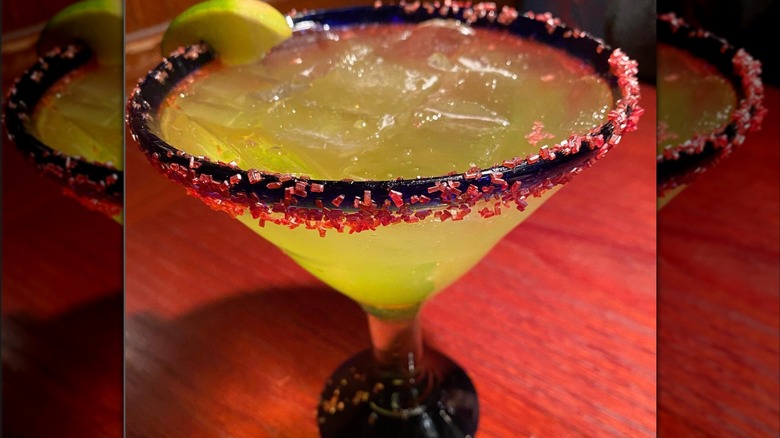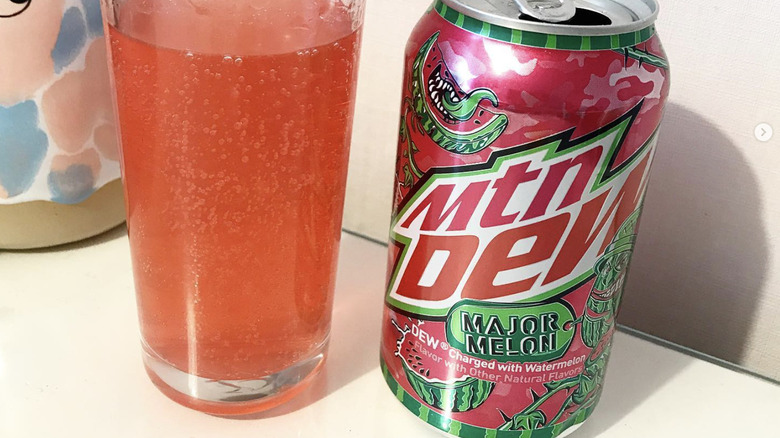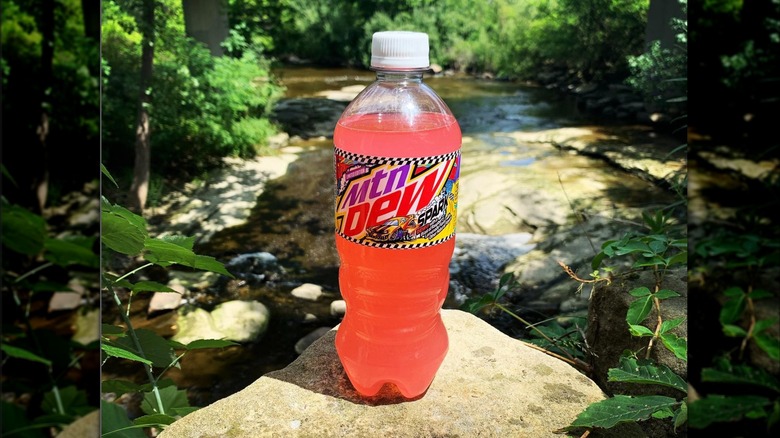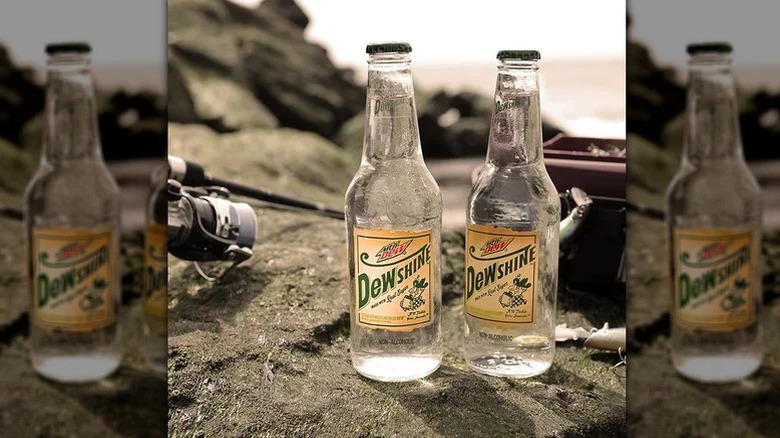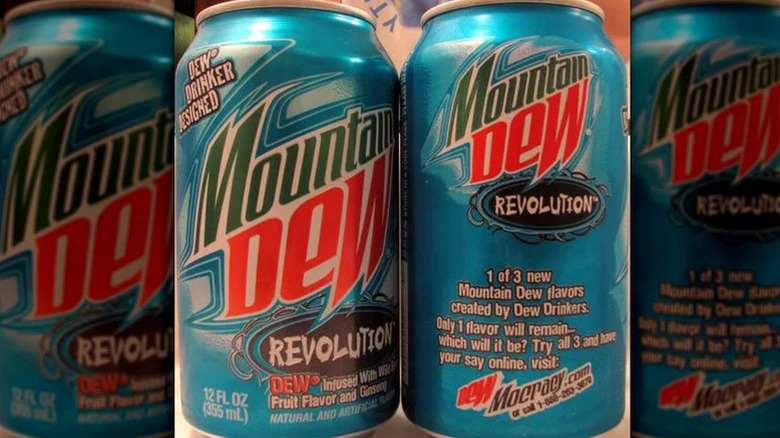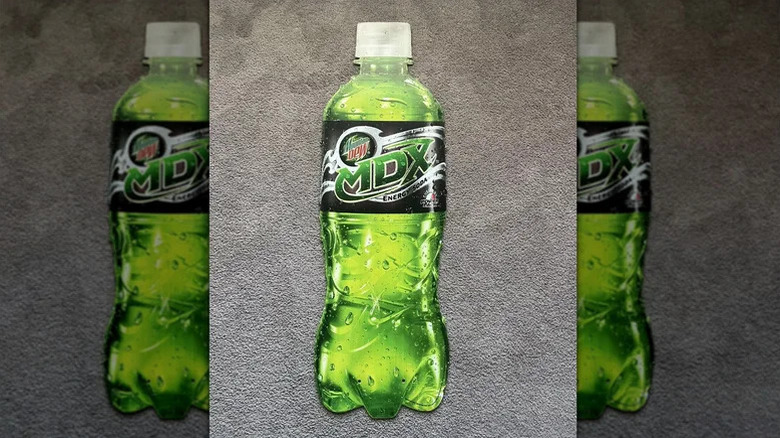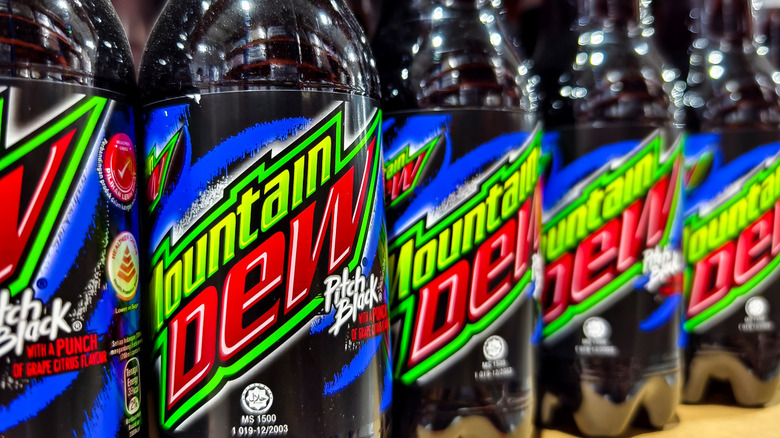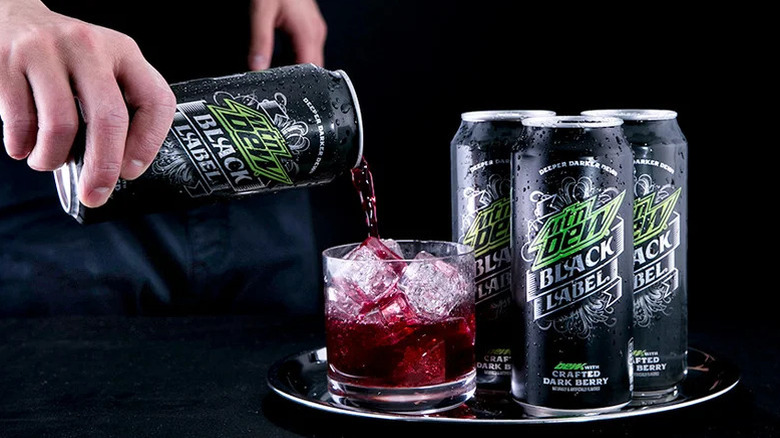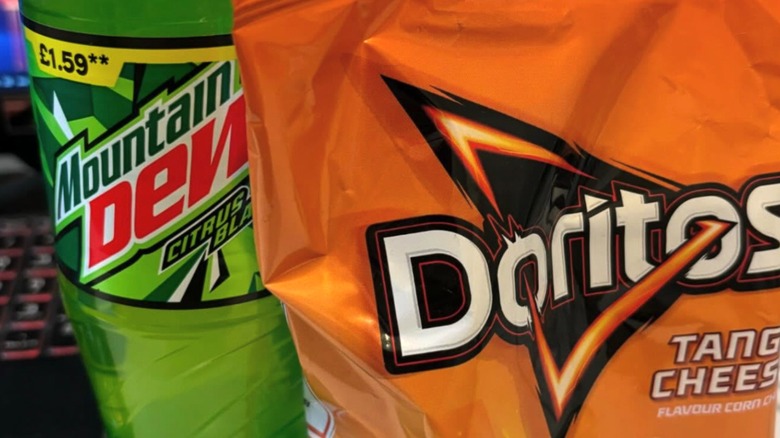13 Discontinued Mountain Dew Flavors We Want Back In Stores ASAP
We may receive a commission on purchases made from links.
Mountain Dew often leans into the sublimely ridiculous. This is evident in its many advertising campaigns that feature extreme-sports stunts and absurd humor — speaking of which, Mountain Dew's 2025 Super Bowl ad seriously freaked us out. But the ever-evolving flavors of this soda line are equally surreal.
The original flavor of Mountain Dew is a vague blend of citrus fruits. With its name taken from a slang term for illegal moonshine, Mountain Dew began life in the wake of the Prohibition era as a mixer for strong alcohol. After Pepsi bought the brand in 1964, it made Mountain Dew one of the flagship brands in its soda portfolio, offering it as an extra-sweet, highly caffeinated, fruity, and nationally available alternative to the same old colas.
Over the following decades, Mountain Dew just kept growing its cultural impact and consumer base, as well as its retail imprint and variety of flavors. Nowadays there are many Mountain Dew flavors available at various stores, not to mention Taco Bell outlets. Mountain Dew — and its corporate parents at PepsiCo — have seemingly adopted a try-anything-and-see-what-happens approach when it comes to introducing Mountain Dew flavors. Variants on the original recipe, or brand-new concoctions bearing the Mountain Dew name, come and go with great regularity. Some flavors are quickly and/or rightfully forgotten, while others make an impression and win over fans, but disappear nonetheless. Here are 13 discontinued Mountain Dew flavors that we'd love to get to taste again.
Mountain Dew Berry Monsoon
Mountain Dew has carved out a niche in the crowded soda marketplace with imaginative flavor mash-ups not seen anywhere else in the mainstream soft-drink sector. To wit: In the summer of 2018, customers could enjoy a new Mountain Dew flavor, Berry Monsoon.
As recorded on Mountain Dew's X account, Berry Monsoon offered "a storm of berry lime refreshment." Never packaged in bottles or cans, Mountain Dew Berry Monsoon was available only as a choice from the soda fountains at the food courts of Sam's Club warehouse bulk stores. Eschewing the typically red color generally associated with mass-produced berry-flavored products, Mountain Dew Berry Monsoon came in a bright turquoise shade, and reportedly tasted like melted blue slushie drinks.
Perhaps due to its precise exclusivity, Mountain Dew Berry Monsoon wasn't a huge success during the first year of its existence. However, the flavor briefly became a viral sensation in the fall of 2019. In collaboration with brand-sponsored NASCAR driver Chase Elliott, the "Chase the Monsoon, Get A Ride" promotion required entrants to post a photo of themselves with a cup of Mountain Dew Berry Monsoon on social media with the hashtag #RideLikeChaseSweepstakes. Nonetheless, that didn't lead to a permanent uptick in popularity, as the berry-lime blend was apparently discontinued by October 2023.
Mountain Dew Southern Shock
Mountain Dew's iconic Baja Blast flavor has historically been associated with Taco Bell, as it was originally available only as a fountain drink at that Mexican-American fast food chain. However, in a rare co-branding event with another restaurant chain, Mountain Dew launched a bespoke flavor seemingly designed to fit in with a different flavor profile and geographical area.
In the summer of 2020, Bojangles — a Cajun-style fried chicken restaurant chain primarily found in the American South — served as the exclusive home of Mountain Dew Southern Shock. Sporting a vibrant orange-red color, the summery, spice-alleviating fountain drink was marketed as a combination of original-flavor Mountain Dew with a kick of tropical fruit punch.
Consumers noticed that Southern Shock contained notes of peach, honey, and strawberry ... or at least Mountain Dew's version of those tastes used in previous flavors. Mountain Dew Southern Shock occupied a slot on Bojangles fountain drink dispensers for the better part of three years. Alas, in 2023, the chain reportedly stopped stocking it, and so Southern Shock disappeared from the market entirely when supplies ran out.
The Dew Garita
While there are many menu items you should never order at Red Lobster, there is one that you simply can't order at Red Lobster anymore, because after it appeared on the menu with much fanfare, it was taken away with little notice. In the fall of 2020, the first officially authorized alcoholic cocktail made with Mountain Dew was offered for sale at some Red Lobster restaurants. The drink: the Dew Garita, a bright-green, citrus-infused, tequila-based libation made in the traditional margarita-mixing method, but with the juice component substituted out for real Mountain Dew.
Sold only as a mixed-to-order drink at Red Lobster, and never canned or bottled, the Dew Garita was pitched as a meal starter at the seafood restaurant chain, recommended to be paired with Cheddar Bay Biscuits. Priced at $10 and made with soda, booze, and a not-widely-disclosed list of other ingredients, the Dew Garita seemed designed as a novelty item to get Americans to return to restaurant dining following COVID-19 lockdowns that shut down in-person service. The drink reportedly didn't taste much like Mountain Dew, however, and after some initial hype, the Dew Garita faded from public consciousness, lingering on the Red Lobster menu until it was declared to be discontinued in 2022.
Mountain Dew Major Melon
After more than 10 years of introducing new Dew flavors that were expressly only offered for a limited time, when Mountain Dew launched its Major Melon variety in January 2021, PepsiCo announced that this product would be a permanent fixture in its fruity soda lineup. Historically, the big soda companies haven't delved much into melon-flavored soft drinks, so Mountain Dew Major Melon was innovative in that regard. "Charged with Watermelon" — as bottles and cans of the stuff noted — Major Melon came in a bright pink color that perfectly resembled real watermelon flesh, and was sold in both full-sugar and sugar-free versions.
But for Mountain Dew, "permanent" doesn't quite seem to mean forever. Mountain Dew Major Melon wasn't a seasonal offering or a stunt product, and it was available in a wide array of retail outlets in various permutations of cans and bottles. But by early 2025, the soda company purportedly stopped making and distributing Major Melon (along with some other underperforming flavors) in order to make room for some new attempts to win over customers.
Mountain Dew Spark
Following a low-key trial rollout that was reportedly restricted to Speedway gas-station convenience stores in the summer of 2020, Mountain Dew Spark sold so well in that relatively small sector that the manufacturer brought it back to that chain from August to October of 2021. Sensing that the rest of the Dew-purchasing public who didn't shop at Speedway might be interested in this breakout hit of a beverage — flavored like raspberry-infused lemonade — PepsiCo introduced Mountain Dew Spark to the general retail market in January 2022, sold in 20-ounce bottles, six packs of 16.9-ounce bottles, cans via vending machines, and as a fountain option to interested restaurants and outlets.
When Mountain Dew Spark made its national debut, so too did the sugar-free version, Mountain Dew Spark Zero Sugar. But despite the appeal proven during its exclusive run at Speedway, neither Mountain Dew Spark nor Mountain Dew Spark Zero Sugar could make it as a permanent product with widespread distribution. Multiple media outlets announced that the flavor went out of production in February 2025.
Mountain Dew DEWshine
Premium sodas were all the rage in the early 2010s, and Mountain Dew wasn't about to lose market share because of customers who wanted all of soda's sweetness, archetypal flavors, and carbonation, but with naturally skewing ingredients combined in a more careful process. In March 2015, clear Mountain Dew DEWshine arrived. Similarly to the popular imported bottles of Coca-Cola that are made in Mexico with real cane sugar instead of high fructose corn syrup, DEWshine used real sugar in its familiar recipe, and it was inspired by its historic origins as a sweet and flavor-rich mixer to make moonshine more palatable.
Sold only in glass bottles at a slightly higher price point than regular, plastic-packaged Mountain Dew — as well as in old-fashioned glass jugs offered in limited quantities — the product earned some criticism. Some naysayers alleged that DEWshine, with its glass vessels and moonshine-affiliated name, could trick customers into thinking it contained hooch, or serve as a gateway beverage for kids. With products like DEWshine, "the line between alcoholic and non-alcoholic beverages is intentionally being blurred," said Michael Scippa of Alcohol Justice to USA Today. However Pepsi tried to market DEWshine, it didn't quite work. Two years after DEWshine was first produced, it was discontinued.
Mountain Dew Sangrita Blast
Sangrita is a popular drink in Mexico, where it's enjoyed as a sweet, spicy, and strongly flavored tequila chaser frequently made with tomato juice and citrus fruits like orange and lime, along with a healthy dose of chili powder. This piquant concoction was re-created for Taco Bell in late 2013, according to fans, when the Mexican fast food chain served Mountain Dew Sangrita Blast as an option on its fountain drink dispensers across the United States.
Following two years of its availability being exclusively an on-tap soft drink at Taco Bell, in 2015 Mountain Dew began selling Sangrita Blast in bottles and cans. While it earned plenty of enthusiasts, according to critics, Mountain Dew Sangrita Blast — marketed as a kind of citrus fruit punch — was overwhelmingly flavored with too much citrus taste, and some even complained that they suffered from heartburn after drinking it. The packaged version of Sangrita Blast turned out to be a limited-time-only affair, as Mountain Dew reportedly stopped making the product available in bottles and cans by 2017. Although this Mountain Dew variety remained available for a while after that at Taco Bell, it was last seen there in early 2019.
Mountain Dew Revolution
In 2007, Mountain Dew opened up the process of creating new flavors to its most ardent consumers via its DEWmocracy campaign, which included a website that invited consumers to virtually create novel versions of the soda with individualized tastes, colors, and labeling. Three fan-created flavors garnered enough support to become contest finalists, and earn limited-time runs of these liquid fantasies brought to life. These finalists were the strawberry-melon Mountain Dew Supernova, the raspberry-citrus Mountain Dew Voltage, and Mountain Dew Revolution. The latter was pale blue in color — a hue befitting its berry-based taste — and the drink was enhanced with the flavor of ginseng.
While Revolution was not a winner of the DEWmocracy movement, it didn't disappear forever. It apparently had enough of a cult following that Mountain Dew brought the flavor back in a very limited format in 2011. It reportedly was a prize in a contest on Mountain Dew's Throwback Shack website, with the winner receiving a wooden crate containing 12 glass bottles of Mountain Dew Revolution. As of 2025, that's the last time that this not-so-revolutionary beverage seems to have been available for any type of public consumption.
Mountain Dew MDX
The market for energy drinks — which are essentially sodas with a medicinal taste that are sometimes fortified with vitamins and a massive load of caffeine — exploded into a multi-billion-dollar business by the early 2000s. Not wanting to be eclipsed by products that were marketed to the same demographics as the extra-caffeinated Mountain Dew, brand bosses at Pepsi unleashed an energy drink bearing the soft drink's name and profile in 2005. Initially test-marketed under the name Mountain Dew X, the product that would hit stores as Mountain Dew MDX looked a lot like standard Mountain Dew, in that it was a bright and unnatural green and sold in clear plastic bottles.
The product apparently didn't catch on, because a year later, Pepsi revamped its Mountain Dew MDX marketing, with new ads that confusingly claimed the drink was energy-infused, rather than being an energy drink. That tweak wasn't effective, and Mountain Dew MDX was gone by 2007.
Mountain Dew White Out
In 2010, Mountain Dew launched another promotion for fans and consumers to pick the flavor they most wanted to see enter national distribution. The candidates of DEWmocracy 2 were the lime-flavored Mountain Dew Distortion, the tropical-punch concoction Mountain Dew Typhoon, and the eventual winner: Mountain Dew White Out. This triumphant drink was cloudy-white in appearance, and featured a variant of Mountain Dew's tried-and-true citrus flavor, said to include hints of yuzu and lemongrass. This product was unique among Mountain Dew styles in that the same name was reportedly used for different beverages sold around the world. In New Zealand, Mountain Dew White Out was marketed as a lemon soda, while in Japan, it was pushed as a more general citrus drink.
As the winner of DEWmocracy 2, Mountain Dew White Out became a permanently available product, a designation that lasted for about a decade. Pepsi officially stopped making Mountain Dew White Out by 2020.
Mountain Dew Pitch Black
In the fall of 2004, Mountain Dew embraced the spooky Halloween season with Pitch Black, a special-edition drink that dared to go dark. While its flavor was a pretty standard mashup of grape and citrus, Pitch Black was so deeply dyed that it looked less dark purple and more like India ink. This seasonal item — or at least its presentation — was such a hit with consumers that the product rose from the grave in 2005 with a horror-movie-sequel name, Mountain Dew Pitch Black II.
Once again, the product was pulled after a short period of time in stores. But when Mountain Dew created the "Back by Popular Dewmand" campaign in 2011 to gauge fan interest in reviving lost and forgotten flavors, Pitch Black was one of the variations fans wanted to see again, and so it haunted the shelves of retailers once more for a limited time. Since then, like any proper Halloween villain, this soda has come back from the dead multiple times over the years, most recently showing up for a brief period in 2022.
Mountain Dew Black Label
Mountain Dew is a drink created and marketed as a beverage for the unpretentious masses. However, the brand attempted to make a move into more highbrow and classy circles in 2016. Three entries in the Mountain Dew Label Series were presented as the soda familiar to millions but featuring "crafted fruit flavors" that would "excite taste buds and exhilarate the senses," according to PepsiCo Partners. Mountain Dew White Label was a tropical citrus blend, Mountain Dew Green Label featured apple and kiwi notes, while Mountain Dew Black Label tasted of "dark berry," and it bore a deep maroon color when released from its tall cans.
According to fans, Mountain Dew White Label and Mountain Dew Green Label flopped quickly, and were discontinued with little notice. Mountain Dew Black Label outlasted its upscale siblings, and was reportedly still found in stores as late as 2020, despite production on this commercial misfire ending at around the same time.
Dewitos
PepsiCo is at the forefront of the American junk food industrial complex. Not only does this conglomerate own the entire line of Pepsi-produced sodas, but it's also the umbrella corporation that runs Frito-Lay, the purveyor of numerous brands of salty snacks. In a 2014 cross-promotional stunt that chased viral status by attracting the profanely curious, PepsiCo devised a bizarre hybrid of its Mountain Dew beverage and Doritos corn chips.
Going right to its target market of young and game consumers, Pepsi set up test-market kiosks on a number of college campuses across the United States, where vendors offered free sample cups of potentially new Mountain Dew flavors. In addition to soda prototypes in flavors of lemon ginger, rainbow sherbet, and mango habanero, the Dewitos soda was the variant that got the most attention, both from tasters and the media. Resembling an orange soda in color, Dewitos tasted "like Doritos in liquid form," one test subject reported on Reddit, adding that "it was like a weird mix of Mountain Dew flavor and Doritos. Like if you shoved a handful of Doritos in your mouth and chugged some Dew at the same time." PepsiCo and Mountain Dew apparently took such lukewarm reviews into consideration, because Dewitos was never mass-produced, much to the chagrin of the nation's more adventurous soda drinkers.
